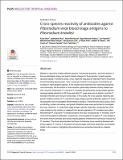Cross-species reactivity of antibodies against Plasmodium vivax blood-stage antigens to Plasmodium knowlesi
Abstract
Malaria is caused by multiple different species of protozoan parasites, and interventions in the pre-elimination phase can lead to drastic changes in the proportion of each species causing malaria. In endemic areas, cross-reactivity may play an important role in the protection and blocking transmission. Thus, successful control of one species could lead to an increase in other parasite species. A few studies have reported cross-reactivity producing cross-immunity, but the extent of cross-reactive, particularly between closely related species, is poorly understood. P. vivax and P. knowlesi are particularly closely related species causing malaria infections in SE Asia, and whilst P. vivax cases are in decline, zoonotic P. knowlesi infections are rising in some areas. In this study, the cross-species reactivity and growth inhibition activity of P. vivax blood-stage antigen-specific antibodies against P. knowlesi parasites were investigated. Bioinformatics analysis, immunofluorescence assay, western blotting, protein microarray, and growth inhibition assay were performed to investigate the cross-reactivity. P. vivax blood-stage antigen-specific antibodies recognized the molecules located on the surface or released from apical organelles of P. knowlesi merozoites. Recombinant P. vivax and P. knowlesi proteins were also recognized by P. knowlesi- and P. vivax-infected patient antibodies, respectively. Immunoglobulin G against P. vivax antigens from both immune animals and human malaria patients inhibited the erythrocyte invasion by P. knowlesi. This study demonstrates that there is extensive cross-reactivity between antibodies against P. vivax to P. knowlesi in the blood stage, and these antibodies can potently inhibit in vitro invasion, highlighting the potential cross-protective immunity in endemic areas.
Citation
Fauzi , M , Kim , N , Nyunt , M H , Firdaus , E R , Han , J-H , Hoque , M R , Lee , S-K , Park , J-H , Moon , R W , Lau , Y L , Kaneko , O & Han , E-T 2020 , ' Cross-species reactivity of antibodies against Plasmodium vivax blood-stage antigens to Plasmodium knowlesi ' , PLoS Neglected Tropical Diseases , vol. 14 , no. 6 , e0008323 . https://doi.org/10.1371/journal.pntd.0008323
Publication
PLoS Neglected Tropical Diseases
Status
Peer reviewed
ISSN
1935-2727Type
Journal article
Description
Funding: FM would like to thank Indonesia Government Fund for Education for the financial support of his scholarship. This study was supported by Indonesia Government Fund for Education (LPDP/20140812021475) (FM), by the National Research Foundation of Korea (NRF) grant funded by the Korea government (MSIP) (NRF-2017R1A2A2A05069562) (ETH), by the Basic Science Research Program through the National Research Foundation of Korea (NRF) funded by the Ministry of Science, ICT and Future Planning (2015R1A4A1038666) (ETH). RM is supported by a UK Medical Research Council Career Development Award Fellowship (MR/M021157/1).Collections
Items in the St Andrews Research Repository are protected by copyright, with all rights reserved, unless otherwise indicated.

